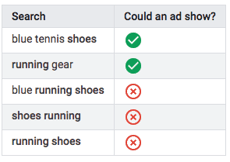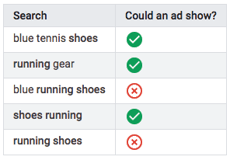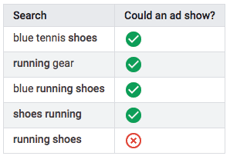

Get monthly notifications
Why you should keep a close eye on your negative search terms
Negative search terms, or negative keywords, are an important part of a well targeted campaign. By using them, you’ll avoid having your ads show up when the wrong users are looking for the wrong things – and ultimately save a lot of money on your search campaign.
What are negative search terms?
Negative search terms are keywords or phrases you set up in your Google Ads to prevent certain words or phrases from triggering your ads when a user searches for them.
By excluding these negative words, you can focus on only those keywords that matter to your customers. Your target will be more specific and your ads won’t be shown to the wrong users. Because to get a great targeted campaign, you must also keep in mind what not to target!
Don’t pay for unnecessary search terms and save money on your ad campaign
If you don’t keep a close eye on your negative keywords – you will ultimately pay for unnecessary search terms – and waste your money on users that are never going to buy your products or even click on your ads.
Someone searching for “cheap nike air max sneakers” or “louis vuitton replica” won’t ever be interested in buying the real thing. Even “second hand” or “used” could trigger the wrong users.
In Google Ads, it’s easy to see what people searched for prior to seeing and clicking on your ad. This is usually very useful when adapting and refining your keywords – but it’s also necessary to keep track of what people search for, that you DON’T want your ads to be triggered by.
If you have a campaign with the keyword term 'leather shoes', your report will perhaps show that your ads are triggered by the search 'second hand leather shoes' as well.
Adding this search term to your campaign as a negative one, you’ll easily exclude these from the Google search results, and reduce your ad spend.
You can also use negative keywords if you have a campaign in the display network or in videos to avoid targeting the wrong sites or videos.
Different negative search terms will bring different results
In search campaigns you can use three different types of negative search terms: broad, phrase or exact matches.
- Negative broad match is the standard type for negative search terms – where every word will be excluded when used in the same search, regardless of order. And if only one of the words is used in a search, your ad might still show.
- Negative phrase match is a search term that will keep your ads from showing in a search that contains the exact keywords in the same exact order. Additional words or a different order of the keywords might however trigger your ad.
- Negative exact matches is a search phrase that only keep your ad from showing if the search contains those exact keyword terms, in that exact order. If the search contains additional words together with your exact search phrase, however, your ad may still show.



Tip! Keep in mind that you must add every different version of a negative keyword to exclude it in your search campaign – such as misspellings, singular or plural versions or synonyms.
It’s important to choose your negative keywords carefully. If you use too many, your ads might not get the reach you need. On the contrary, using too few or too broad keywords, your ad might still show on searches, in videos or on pages that contain variations of these negative search terms. Read more in Google’s guide about negative keywords.
People search for weird stuff – be careful!
For retail businesses, it’s especially important to keep track of unwanted search terms. Users tend to search Google for everything, which may easily result in strange search queries where your products might show up if you don’t watch out. Lots of searches tend to include adult content related results – and it’s a retailer’s nightmare to have to pay for these search terms!
Keeping a close eye on what search terms trigger your ads, and looking into your Google Ads reports every so often, you can add and adapt your negative search terms to improve your search campaigns. This way, you’ll both save money on your ads, and keep your precious products away from those unwanted ( read bizarre) user searches!
Featured Articles
The Full Funnel Approach and Pinterest
Today, we're going to delve into the significance of working with a full-funnel strategy and understanding why a comprehensive media mix is crucial. We'll also explore an example of how this approach and including Pinterest in the media mix led to a significant decrease in the cost of sales for Houdini.
Master Text Overlays: Boost Ad Engagement
In recent years, capturing the attention of your target audience has become more challenging than ever. Businesses and marketers are constantly on the lookout for innovative ways to stand out in the crowded advertising landscape.
One effective technique to draw attention to your ad's message is through the use of text overlays on image and video ads. In this blog, we will explore the best practices for incorporating text overlays, ensuring your message is impactful without compromising the visual appeal of your ads.
Similar Articles
Protect Your Facebook Business Account from Phishing: Expert Tips by Keywordio
Hello everyone, Johan here from Keywordio. Today, I want to share crucial insights into phishing—what it is and how you can safeguard your Facebook business account from this prevalent threat.
Exploring the Future of TikTok: Insights from the 2024 Trend Report
Introduction
I'm excited to delve into TikTok's comprehensive "What's Next 2024 Trend Report." This report is a treasure trove for anyone in digital marketing, offering deep insights into the future of content, storytelling, and consumer engagement on TikTok.
E-Commerce Excellence: Meta's Advantage+ Shopping Campaigns Redefined
Welcome to the dynamic world of e-commerce, where Meta's Advantage+ shopping is reshaping how businesses connect with customers. In this blog post, we'll explore the key features of this innovative tool.
Introducing TikTok Shop
Today, I bring to your attention a revolutionary update from TikTok, a platform where over 150 million Americans seek daily doses of inspiration and entertainment. With a plethora of trends, fashion hacks, beauty nuggets, and a smattering of recipes, TikTok has emerged as a modern-day oracle for curious minds. The excitement in the air thickens as we unveil TikTok Shop to the US, an avant-garde conduit for folks to spot and snag their adored items seamlessly.
The Full Funnel Approach and Pinterest
Today, we're going to delve into the significance of working with a full-funnel strategy and understanding why a comprehensive media mix is crucial. We'll also explore an example of how this approach and including Pinterest in the media mix led to a significant decrease in the cost of sales for Houdini.
Master Text Overlays: Boost Ad Engagement
In recent years, capturing the attention of your target audience has become more challenging than ever. Businesses and marketers are constantly on the lookout for innovative ways to stand out in the crowded advertising landscape.
One effective technique to draw attention to your ad's message is through the use of text overlays on image and video ads. In this blog, we will explore the best practices for incorporating text overlays, ensuring your message is impactful without compromising the visual appeal of your ads.
The Next Big Thing: 5 Digital Marketing Trends to Watch for in 2023
Digital marketing is a constantly evolving field, shaped by emerging technologies, changing consumer behaviors, and the dynamic nature of the online landscape. Staying on top of the latest trends is crucial for businesses and marketers to effectively engage with their target audience and drive growth. In this introduction, we will explore some of the key digital marketing trends that have emerged in recent times.
The Power of Branding on Meta
Are you ready to unlock unparalleled opportunities and take your online business to new heights? In a rapidly evolving digital landscape, Meta continues to revolutionize the way marketers and entrepreneurs create an impact on buyers.
Today, we will talk about the immense potential of branding on Meta's platforms, Facebook and Instagram based on our Meta Branding (Online Course). Brace yourself for insights that will empower you to establish a strong brand identity, harness consumer trends, and optimize your advertising strategies like never before! Ready to spearhead your business to success? by understanding the potential of branding on Meta and how you can tap into it. Excited? So are we - let's get into it!
A Sneak Peek into Pinterest's 2023 Product Updates!
Pinterest is improving its Ads Manager to provide a seamless experience for advertisers. New features will be released throughout 2023 to optimize advertising strategies. Pinterest aims to offer powerful tools and insights for better campaign results. Get a sneak peek into the exciting updates coming to Ads Manager this year.